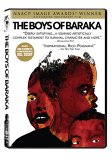| Reviews & Columns |
|
Reviews DVD TV on DVD Blu-ray 4K UHD International DVDs In Theaters Reviews by Studio Video Games Features Collector Series DVDs Easter Egg Database Interviews DVD Talk Radio Feature Articles Columns Anime Talk DVD Savant Horror DVDs The M.O.D. Squad Art House HD Talk Silent DVD
|
DVD Talk Forum |
|
|
| Resources |
|
DVD Price Search Customer Service #'s RCE Info Links |
|
Columns
|
|
|
Boys of Baraka, The
The school of hard knocks...African-style
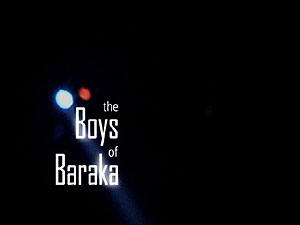 Reviewer's Bias*
Reviewer's Bias*
Loves: Good documentaries
Likes: Feel-good stories, Alternative education
Dislikes:
Hates: Bad parents, Kids who refuse to learn
The Movie
What's the answer for a troubled kid whose parents have failed him, whose school has failed him and whose neighborhood has failed him? Change the scenery. That's the response from The Baraka School, an American-run school in Kenya, which takes 20 at-risk male students from Baltimore and turns them into students by removing negative influences and putting all the responsibility onto them. It's quite a culture shock and a reality check for youngsters used to city streets and taking pity on themselves. Now they see dirt roads and abject poverty, and there are only two ways out: fail and be sent home or succeed and move on. (Considering how low people's expectations are for the students, one wonders what kind of threat failure is, but that's besides the point.)
The film follows a handful of students, each with a rather well-defined personality, including Devon, who wants to be a preacher, Richard, a delayed student, and Montry, a class clown. After spending a good amount of time establishing the depressed status of the schools and lives of these students, one of whom is the child of a drug-addicted mother, the film follows them to Africa. It gets obvious quickly that just moving the location of the school wasn't going to fix everything, as they bring their personalities, good and bad, with them.
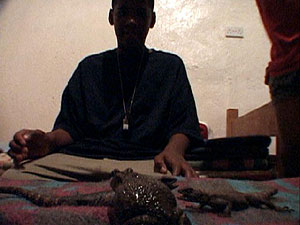 The strange thing is, eventually, they begin to change, slightly. It's the effects of a different kind of schooling, one that illustrates the ills of public schools in America. The teachers have higher expectations of their students, the class sizes are smaller allowing the students to receive more attention and the distractions of violence and drugs are reduced to nothing. And as a result, they have a reason and the resources to succeed. It's a special thing to see someone realize their potential.
The strange thing is, eventually, they begin to change, slightly. It's the effects of a different kind of schooling, one that illustrates the ills of public schools in America. The teachers have higher expectations of their students, the class sizes are smaller allowing the students to receive more attention and the distractions of violence and drugs are reduced to nothing. And as a result, they have a reason and the resources to succeed. It's a special thing to see someone realize their potential.
A monkeywrench no one sees coming is thrown into the works, and suddenly, everything changes. Unfortunately, the film glosses over this somewhat, likely because the results are open-ended. The film seems to end suddenly, and you're left wondering what the past 80 minutes have meant, as the lack of a resolution is a bit off-putting. Sure, life doesn't work like a movie plot, but when you're left hanging like this, it leaves a bad taste in your mouth.
The filmmakers' access to the boys and the very natural way they act in front of the camera is both a miracle, and a likely result of the amount of time shared together. The movie achieves a true fly-on-the-wall feel, which really lets you into their world. The effect is heartbreaking, as seen when one family member has to lie to a child to protect them, and frightening, when one parent screams agrily at her son, threatening to throw him out of the house. For people to act so real in front of a camera is rare, especially when they aren't acting like good people. It's a testament to the connection the directors built with their subjects ,that they could capture such a story.
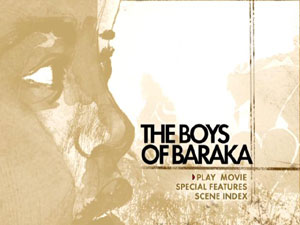 The DVD
The DVD
The Boys of Baraka is a one-disc release, packaged in a standard keepcase, with an insert that has a letter from the directors. The disc has an animated full-frame main menu, with options to watch the film, select scenes and view the special features. There are no audio options, and there are no subtitles, though the disc does have closed captioning.
The Quality
The full-frame video is just what you'd expect from a well-shot documentary. Interior shots are a bit grainy and thin lines get pixelated, while exterior shots fare better. The color is rather bright and vivid, and the level of detail is more than acceptable. Some digital artifacts can be seen in spots as well.
The audio, delivered in a Dolby Digital 2.0 track, is standard, but solid. Dialogue comes across clean, when it's spoken clearly (many lines of dialogue are necessarily subtitled due to some poor enunciating), and the backing music tracks are integrated nicely, without overpowering anything. Everything comes at you from the center, as there's nothing dynamic, as one would expect.
The Extras
The biggest extra is a feature-length audio commentary with co-directors Rachel Grady and Heidi Ewing. The track is mostly the two women chatting about what's happening on-screen, with their thoughts and stories about the production thrown in. It's not the most informative commentary ever, but some additional insight into the film can begleamed from them, including some notes about editing decisions.
A set of six deleted scenes, which can be viewed all at once or separately, add a bit to the film, and really have some value. The scenes about Devon's ministry and Richard's baptism seem especially important as far as their personalities go. For more about the boys, four text screens, "The Boys," provide a post-film update on four of the main characters. Some video of them, to see how they've grown and call back to the video diaries in the film, would have been nice, but at least we find out where they are now.
Apparently, Bill Cosby has seen the film, as the disc includes "A Conversation with Bill Cosby," in which he talks about the themes in the movie. The topics have been important to Cosby for some time, and his recent comments have caused some controversy, so his thoughts on the matter are a good inclusion. This featurette runs approximately six and a half minutes.
Three ThinkFilm trailers are also on this DVD, including the theatrical preview for The Boys of Baraka.
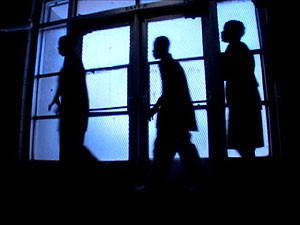 The Bottom Line
The Bottom Line
I didn't expect to enjoy this film, mainly because of my distaste for the ghetto's opinion of education and my feeling that some people just can't be helped. I was surprised to find I was very drawn to the story, and was enthralled at points. The directors found subjects that are very interesting and did a nice job of telling their tales and establishing the atmosphere they were attempting to escape. The DVD presents the film well, and provides a decent amount of supplements that expand on the film. If you enjoy films like "Stand and Deliver" or "Lean on Me," this documentary turns the lens on similar troubles in education, in the real world, and shows there are no simply answers, while telling an interesting story at the same time.
Francis Rizzo III is a native Long Islander, where he works in academia. In his spare time, he enjoys watching hockey, writing and spending time with his wife, daughter and puppy.Follow him on Twitter
*The Reviewer's Bias section is an attempt to help readers use the review to its best effect. By knowing where the reviewer's biases lie on the film's subject matter, one can read the review with the right mindset.
|
| Popular Reviews |
| Sponsored Links |
|
|
| Sponsored Links |
|
|
| Release List | Reviews | Shop | Newsletter | Forum | DVD Giveaways | Blu-Ray | Advertise |
|
Copyright 2024 DVDTalk.com All Rights Reserved. Legal Info, Privacy Policy, Terms of Use,
Manage Preferences,
Your Privacy Choices | |||||||









